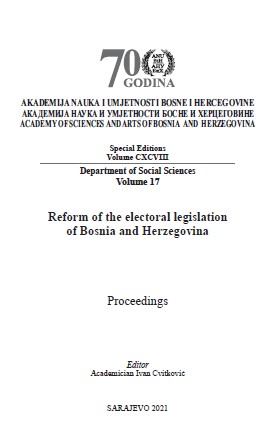Veće učešće žena i Izborni zakon BiH
Increase in the Women’s Participation and BiH Election Law
Author(s): Besima Borić
Subject(s): Gender Studies, Political history, Government/Political systems, Electoral systems, Politics and society, Transformation Period (1990 - 2010), Present Times (2010 - today)
Published by: Akademija Nauka i Umjetnosti Bosne i Hercegovine
Keywords: equality; equal representation; gender quota; open and closed lists; changes to the compensatory lists; preservation of positive solutions; responsibility of political parties;
Summary/Abstract: The period from 1995 until today has been, among other, marked with search for potential models that could secure higher level of women participation not only in legislative bodies but in the executive government and in social and political life in general as well. This is a process that is been continuously conducted in large part of the world, including our BiH and the region. Persistent lack of women at the decision-making positions is most often assigned to our traditional cultural and general social conditions, insufficient democratization of political parties, as well as to the lack of appropriate legislative solutions that would enable good conditions for higher number of women on the lists and in the government bodies. The adoption of the BiH Law on Gender Equality, introduction of quota for less represented sex into the Election Law, in addition to other solutions, has greatly impacted the increase of women in legislative positions. However, this number is still far less than the proclaimed 30% at first, and subsequently 40% obligatory quota of less represented sex on the candidacy lists. There are very few researchers that offer potential concrete amendments to the law that would help in reaching this percentage. It is a general opinion that current election system in BiH favors higher representation of women as less represented sex. It, however, also opens some possibilities for improvement that are hidden in potential parity and equal representation of women and men on the lists, potential closing of the lists, redistribution of the compensatory mandates in favor of the less represented gender, and similar. Also, it would be useful to reconsider the number of political parties, number of election units, as well as raising the census for mandates. In addition, it would be important to preserve the quota which has been attacked so many times in the past 20 years, and keep the provisions that protect prescribed sequence and the quota. The amendments that would favor increase in the number of elected women seek appropriate political climate. That is why it is important to assign the responsibility not only to the legislative decision-makers but especially to the political parties, media, NGO, and other stakeholders.
Book: Reforma izbornog zakonodavstva Bosne i Hercegovine
- Page Range: 112-120
- Page Count: 9
- Publication Year: 2021
- Language: Bosnian, Croatian, Serbian
- Content File-PDF

